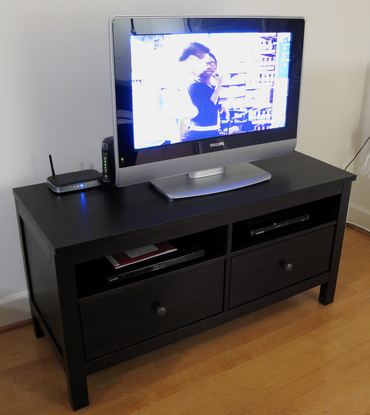
He doesn’t want 20 new channels. Also, he is not happy that, in order to enjoy the sports he wants to watch, he has to subsidize all of the rest, including MTV3, E!, and a host of other channels he would prefer not to have a remote-control click away from his grandchildren.
The Canadian government just announced that it will force cable companies up there to unbundle their services, letting Canadians pick and choose — and pay only for — the
| | channels they want to watch. Canada’s minister of industry, James Moore, told NPR, “We don't think it's right for Canadians to have to pay for bundled television channels that they don't watch.” It hurts a little to have our neighbors to the north school us in the ways of the free market. It hurts even more when you realize the United States isn’t likely to follow suit. While Congress dithers over debt ceilings, nobody seems to notice the fire hose of toxic garbage most Americans have hooked to their television sets, or the toll this takes on families and decency. It could be that Washington is afraid. The cable industry spends millions to lobby Congress and to spread the word that civilization will crumble if we got to choose our own channels. Dan Isett doesn’t buy it. He’s the director of public policy for the Parents Television Council. I reached him at his office in Northern Virginia, where he was more than happy to counter each argument the cable industry uses. Chief among these is that once we get to pick and choose channels, we would end up with higher costs. Without the support of non-sports fans who were forced to subsidize them, the folks at ESPN would have to charge anywhere from $13 to $30 a month for that channel alone. Add in CNN and some classic movie channels and you would be broke. You can look at your own cable bill and figure this one out (hint: the average cost has increased at four times the rate of inflation in recent years). Isett says, “Think about this logically. Why would an industry argue against being able to charge more money for its product?” If market forces teach us anything, it is that the more choices we have, the cheaper things become. ESPN would have to charge a reasonable price or make do with a lot less viewers. The expensive course is the one we’re already on. What about the level of programming? Without cable bundles, a lot of little specialty channels would disappear, right? Isett likes to turn that one around and ask why a product should have a right to exist when nobody wants it. Six large networks control virtually everything you see on cable. There are plenty of specialty channels you might like that don’t have a prayer of wedging their way into your cable bundle. The current system actually inhibits diversity on television. Nor does Isett believe raunchy programming would dominate an a la carte television menu. Plenty of evidence shows people want family friendly programs. Isett said he believes people should be able to get smutty TV if they want it, he just doesn’t think everyone else should be forced to subsidize it. Congress might shy away from TV choice because it believes the government shouldn’t interfere with the television industry. Isett says, “The free market is simply not allowed to work,” under the current system. In many communities, one provider has a monopoly. So far, the only outspoken champion of TV freedom in Congress is Sen. John McCain, R-Ariz. That might change if more consumers reacted angrily to getting 20 new useless channels, or to the content of shows they are forced to support. Isett is optimistic things will soon change in the U.S. I’m not so sure, but I’m willing to hope. |

 RSS Feed
RSS Feed

